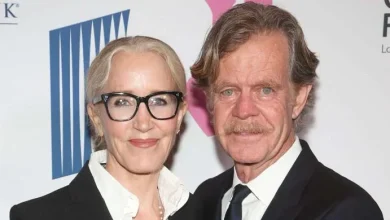Lily Allen describes the breakdown of a marriage in West End Girl

Unlock the Editor’s Digest for free
Roula Khalaf, Editor of the FT, selects her favourite stories in this weekly newsletter.
Lily Allen is, perhaps above all, open. In her 2018 memoir My Thoughts Exactly, she writes about, in no particular order: her ex-husband’s sexual hang-ups; her cocaine addiction; the expensive female escort she repeatedly hired when she was on tour in 2014; her admiration for the music played in strip clubs in the southern US; the extensive time she spent with her father at the Groucho Club as a child; the partners she cheated on and the people she cheated with.
Ever since “Smile”, her 2006 paean to schadenfreude, shot Allen to fame with lines like “But you were fucking that girl next door/What’d you do that for?”, she’s been known for her bluntness and talk-smack cheekiness. At her best she combines the unbridled aggression of the girl at the club who has to be restrained by the bouncers with an aching vulnerability. It’s a mix for which Allen’s only now getting her due — referenced by younger artists such as Pink Pantheress and Olivia Rodrigo — and for most of her career, she was the sometimes willing victim of the gossip industrial complex, a staple of the tabloid front page. This has continued to the present day; her successful podcast, Miss Me?, hosted with fellow noughties It Girl Miquita Oliver, regularly generates controversy
In a bid to reclaim the character of “gobby, mouthy, opinionated Lily Allen”, she explained in her memoir, she discovered that her job “is to write about what I see and what I’ve learned and what I feel and what I know. I then sing out those words using the best voice I can. It’s not world-class, but it’s honest and it’s true.” But, as so often when performing to an audience, it can be hard to distinguish real, unguarded honesty from the show of it, particularly in an era when “relatability” pays dividends and autobiographical intimacy is all but demanded.
It’s hard to shake this sense while listening to the title track of Allen’s new album West End Girl, her first in seven years. A lush, doo-wopping ballad, complete with swooning strings and call-and-response vocals, the song documents a seemingly fairytale romance — the protagonist moving to New York, looking at houses with “four or five floors”, buying a brownstone with her prince charming: “You want it? It’s yours.” But after she’s offered the lead role in a play, her partner’s behaviour changes (“I thought that that was quite strange”) — and so does the song.
The accompanying zither disintegrates into the vibration of a phone call, and the instrumentation halts. We hear only shards of dialogue from Allen’s side — “Well, I mean it doesn’t make me feel great”; “I just, I want you to be happy”. It’s an intriguing conceit, heightened by the staginess of the conversation; the replication of a real past hurt now directed, rehearsed.
Anyone familiar with the past few years of Allen’s life will recognise autobiographical elements: her relationship with Stranger Things actor David Harbour, for whom she moved to New York (a much discussed Architectural Digest tour of their Brooklyn brownstone ensued). The play, too, seems to correspond to the West End production of 2:22 A Ghost Story, for which Allen received an Olivier nomination in 2021. Allen will only say that the album “is inspired by what went on in the relationship”.
What follows, to varying degrees of success, is a no-holds-barred account of the breakdown of a marriage. The album’s 14 tracks mostly keep within the title track’s low-tempo instrumental vein, a choice that has worked for Allen in the past — her delightful 2006 track “Littlest Things”, for instance. But by the time we get to the Spanish guitar of “Just Enough”, it drags. The general staleness of the production is made additionally strange by the mash-up of different genres that appear seemingly at random elsewhere on the album. The worst of these are the middle-of-the-road dub of “Nonmonogamummy”, the Ennio Morricone-lite “Madeline” and the sludgy “Beg for Me”, which would have sounded dated in 2017.
When the album does succeed, it’s because Allen has paired her propensity for rawness with a genuine sweetness, her vocals candyfloss delicate. This is showcased to best effect on the excellent “Pussy Palace”, in which she sings about visiting a partner’s pied-à-terre and finding evidence of the scale of his infidelity. The lyrics combine the comical (“Duane Reade bag with the handles tied/Sex toys, butt plugs, lube inside”) and the heartbreaking (“You’re so fucking broken, how’d I get caught up in your double life?”), all of it sung in the same reverb-drenched cadence, beautiful despite the horror of her discovery.
Exciting, too, are the heightened BPMs of “Ruminating” and “Relapse”, Auto-Tune-heavy tracks that make a convincing case for Allen as a forebear of Charli XCX’s blasé speak-sing confessions on Brat. But with many of West End Girl’s 14 tracks rehashing the same subject matter, the shocks begin to wane. And by ending the album with the therapy-speak-clotted “Fruityloop” and its pat gesture of closure, Allen undermines her own exercise in vulnerability, leaving it feeling like a hollow performance.
★★☆☆☆
‘West End Girl’ is released by BMG





